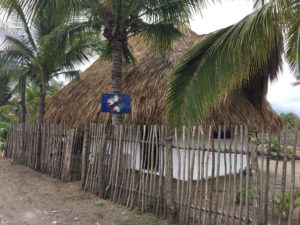Changemaker Catalyst Award recipient Olivia Lenzo traveled to Guatemala to intern at an non-profit women’s reproductive health clinic in Ciudad Vieja – assisting in the provision of pre-natal, post-partum, gynecologic, and labor/delivery services for women of low-income backgrounds. Olivia studies cell & molecular biology as well as Spanish and is entering her final year at Tulane.
______________
This internship greeted me with a huge learning curve and a lot of friendly faces speaking 4 different languages – none of which I was fluent in. The midwives, nurses, and doctors of Manos Abiertas (the clinic I interned at) are of a varied background – Guatemala, Switzerland, Germany, United States. Somehow the clinic managed to run so smoothly and efficiently despite all the room for confusion-induced chaos.
The learning curve: In my first week, I observed. Thoroughly and closely. By the second week, things were very hands-on and my input already seemed to matter. I gave birth control injections, consulted on diagnoses of pelvic exams, performed pap smears, calculated probable due dates for babies, measured and assessed the development of a uterus during pregnancy and after birth, discerned the positioning of a fetus in the uterus – all while my head spun. I have never learned so much so quickly and had to apply what I learned so independently. That had never been an expectation of me before, but at Manos Abiertas it was.
The leadership qualities required to be a change-maker that this environment breads: Manos Abiertas operates with the bare minimum resources required to provide the high quality and breadth of care that it provides. (It is by taking such maximum advantage of few resources that the clinic is able to offer such affordable, accessible healthcare). Under these conditions – I had many responsibilities there and there was an extensive level of aforementioned independence expected in regards to these responsibilities. I think accepting the challenge of a quick, steep learning curve is a large part of leadership development; being receptive to information and learning in order to be a leader for others. Independence also plays a role; accomplishing tasks independently breeds the confidence necessary to be a leader. I think the opportunity to learn and be independent so simultaneously was great fuel in my development as a leader. The learning piece adds some much-needed humility and appreciation for collaboration to the independence/confidence aspect, and together these components interact strongly in the synthesis of leadership and change-making.
The women’s reproductive health climate that is eager for change: Public, government-funded hospitals in Guatemala have developed a custom of taking advantage of patients, providing inconsistent and often unnecessary and overly-invasive care – especially in regards to women’s health. The cesarian section rate is a prominent example. The World Health Organization regularly analyzes childbirth complications data and uses these statistics to generate a recommended maximum cesarian section rate. Currently the World Health Organization reports that, internationally, the c-section rate should not exceed 10-15%. The rate of cesarean sections in public hospitals in Guatemala is about 54% and astonishingly even higher in private hospitals (92%). The majority of these c-sections are performed without proper indication for a number of upsetting reasons (i.e. easier/faster for the hospital, more lucrative for the hospital, training opportunity for newly-minted physicians). On top of Guatemala’s incredibly complicated attitude and culture surrounding family planning/birth control, most women cannot rely on healthcare providers the same way most women in the United States can (i.e. the public clinic one regularly goes to for her birth control method may suddenly not have birth control available one month). All of these characteristics of Guatemala’s reproductive health climate, albeit disheartening, overlap and collide to create a mosaic of new perspective. Accepting and internalizing this new perspective is a key first step towards change-making.
The take-aways: Effecting positive change and coming up with productive solutions to problems is not simple. There is no quick fix or answer – these are processes that take time, thoughtful consideration, and often-monotonous TLC. I learned this through my conversations with the women who founded and have since overseen operations at Manos Abiertas for the past 10 years and firsthand through the work still being done to maintain this project that has been and is still providing a solution for thousands of women in need of well-intentioned, honest, high-quality reproductive healthcare services who would otherwise not have access to such services. I have also learned that it takes an immense level of teamwork and the humility required to accept help from others. Helping others is a central part of the spirit that is so inherent to positive social change; it only makes sense that it is a central part of the means of getting there as well.




